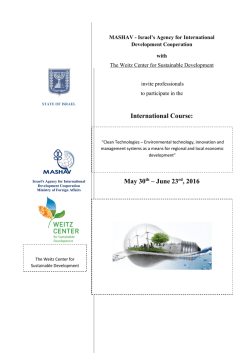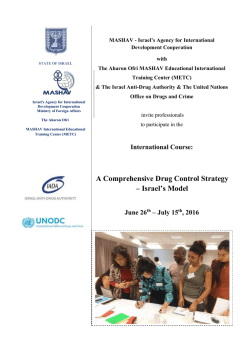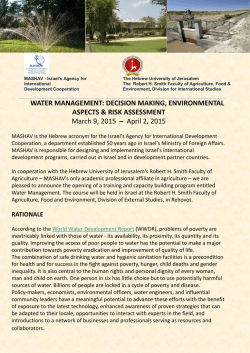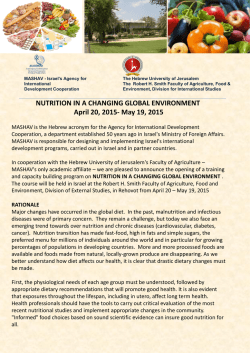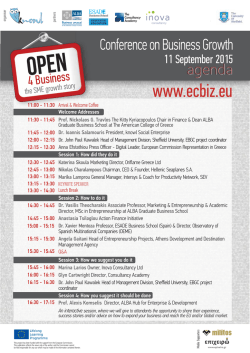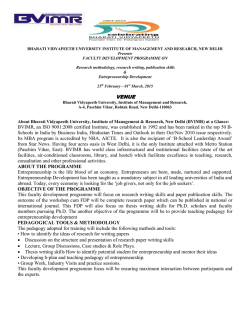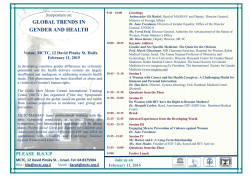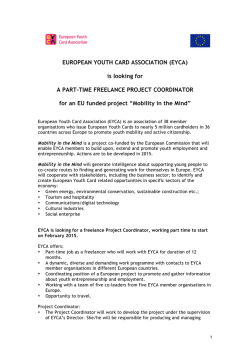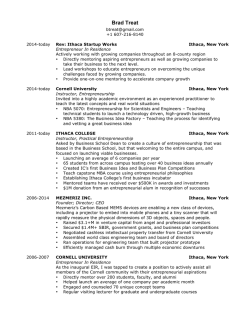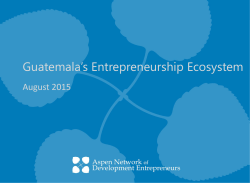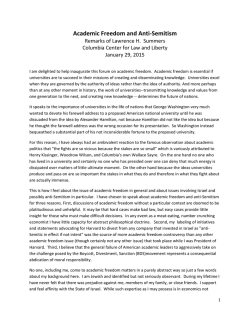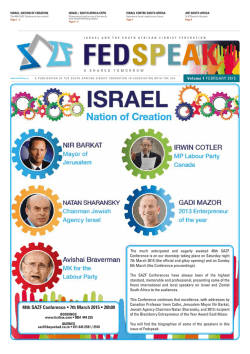
Innovation and Entrepreneurship in the Education
Innovation and Entrepreneurship in the Education System 16.2-12.3.2015 Education for Entrepreneurship "There is no doubt that creativity is the most important human resource of all. Without creativity, there would be no progress, and we would be forever repeating the same patterns." Edward de Bono How is entrepreneurship anchored in the field of education? How may the learning processes be understood and handled according to an entrepreneurial approach? Can innovation and entrepreneurship be taught? It’s an age-old debate!! The answer is both yes and no. Education plays an essential role in shaping attitudes, skills and culture – from the primary level up. Innovation and entrepreneurship in education provide a mix of creativity, experiential learning, skill building and most importantly, a shift in mindset. Certainly the earlier and more widespread the exposure to innovation and entrepreneurship, the more likely students will consider entrepreneurial ideas at some point in the future. The implementation the entrepreneurial idea in the future will reflect the progression in the level of skills and qualifications students need to acquire in the course of their education. Thus the aim in primary and secondary schools is that students develop competencies such as creativity, initiative, inventiveness and personal qualities within all the standards and performance indicators to apply the 21st century skills that are necessary to adapt to our changing world. The innovation and entrepreneurship educational policy must, therefore, be anchored in the specific skills and pedagogic methods of the different academic disciplines. The main focus is on developing cross curricular approaches and making it easier to coordinate the various educational programs as pupils conduct research and prepare written and visual presentations of their work. The pedagogical methods should promote the following: Open learning - in which learning outcomes are determined by the students. Active learning - different situations in which students choose the areas of implementation for their projects. Learning experiences beyond the classroom- through the use of different information sources (resources, experts) and materials from society and the natural environment. A learning atmosphere – which promotes and fosters collaboration and teamwork, encourages new ideas and creativity, tolerance for trial and error and tolerance of failures. Thinking strategies - identification of significant questions, and problem-solving skills that clarify various points of view and lead to better solutions. Another main point to consider is the position of the educators as role models in a dynamic and social process where individuals alone, or in opportunities for innovation. In this process it is essential to skills to act upon these aspects by transforming ideas into activities, whether in a social, cultural or economic context collaboration, identify build up the educators' practical and targeted .This should be done through capacity building, competence development, practical experience research with an ongoing training in innovative teaching and learning methods. and As one of the practical levels of innovation and entrepreneurship in education, the school becomes a place for experimenting, a place to develop and participate in project-based learning environments, a place where entrepreneurship is part of the organizational and educational culture and where the teacher and the director are entrepreneurs themselves. Aims of the course To provide new tools and knowledge on the implementation and development of Innovation and Entrepreneurship in the educational system. To promote and create a learning environment that leads the students to experiment Innovation and Entrepreneurship methods and practices. To share experiences of Innovation and Entrepreneurship in education. To create tools for communication, collaboration and team work. To provide educational tools for quality innovative educational pedagogies. To support the integration and the implementation of 21st century education skills. To present innovative teaching methods for specific subject-matters (science, language, etc.), as well as interdisciplinary subject areas, enabling participants to choose the methods and tools suitable to the particular needs of their environments. To empower the educational staff and promote their Innovation and Entrepreneurship programs. To provide a base for future training activities in the Education for Innovation and Entrepreneurship training according to the needs of the different countries and institutions Course Content Development of ways of thinking: critical, creative, strategic and tactical thinking. Development of social skills, collective performance techniques and teamwork. Analyzing the incorporation of innovative ideas. Presenting the importance of a supportive environment and a community of learning. The influence of motivation for learning and self-improvement. Becoming an entrepreneur: skills, concepts and practices. The Educator / Teacher / Entrepreneur: Education & work culture, curricula development, educational initiatives, project development, project-based learning, innovation in education, success stories, the educator as an entrepreneur and a leader. Student-based Learning: Student entrepreneur communities, examples of initiatives. The school and the community as entrepreneurs. Presenting the idea of experimental schools as entrepreneurial environments. Methodology • Lectures and discussions led by experts in various fields. • Workshops. • Analysis of educational planning through written material and professional visits. • Meetings with institutional administrators and acquaintance with projects at the national and regional level. • Simulations, panel discussions, and group work. • Preparation of final projects by individuals or groups, based on the professional interests of participants. • Study tours at: different types of schools at all levels, educational centers (science, art, etc.) and teacher training institutions and pedagogical resource centers Social Activities and Tours The seminar includes organized tours of holy sites and locations of general and historical interest. Social and cultural activities will be arranged. Required Status for Participants High-level educational staff, regional or national, lecturers at teacher training institutions, school principals, counselors, or supervisors, and researchers in relevant fields. Certificate A Certificate of Studies will be awarded to participants who have attended classes regularly and fulfilled all requirements. Applications: Application forms should be send to the relevant Israeli Mission and to the Ofri Center by or before 10.1.2015 Application forms and other information may be obtained at the nearest Israeli mission and Or at MASHAV’s website: http://mashav.mfa.gov.il (Courses) Or at www.ofri.org.il Accommodation Participants will stay at the Ramat-Rachel Hotel, located on the outskirts of Jerusalem, on a two person per room basis. For more information: http://www.ramatrachel.co.il. Social Activities Participants are requested to bring traditional clothing that represent their country for cultural and folklore presentations during the workshop. If the participants wish, they may bring souvenirs from their countries to present to other participants. Medical Insurance MASHAV will cover medical services and hospitalization in case of emergency. It does not cover the treatment of chronic or serious diseases, dental care, eye glasses, and the period of pregnancy or specific medication taken by the participant on a regular basis. Health forms must be completed and signed by a physician. The insurance policy does not cover damage or loss of personal belongings. Flights, Passport and Visas: The scholarship given by MASHAV does not include the cost of the flight ticket to Israel and/or from Israel. We highly recommend booking your arrival for the day before the beginning of the seminar, and your departure for the day after the seminar ends. Passports must be valid for the duration of the entire seminar, and must include an entry visa to Israel. Two additional passport-size photographs for various documents are required. Should you plan to visit or transit via other countries while on your way to and from Israel, please arrange visas before leaving home, as there is no possibility of receiving visas in Israel. MASHAV – Israel’s Agency for International Development Cooperation MASHAV – Israel’s Agency for International Development Cooperation - at Israel’s Ministry of Foreign Affairs was founded in late 1957, and is responsible for the design, coordination and implementation of the Sate of Israel’s development cooperation programs. MASHAV concentrates on human and institutional capacity building by sharing Israel’s own development experience and expertise, imparting know-how and transferring innovative technologies and tested methodologies adaptable to developing country needs. MASHAV’s approach is to ensure social, economic and environmental sustainable development, joining the international community's efforts to implement the Millennium Development Goals by 2015. In events of natural disasters, MASHAV also provides humanitarian assistance and participates in reconstruction and rehabilitation efforts. A Window to Innovations in Education The A. Ofri International Training Center was established in 1989 as a professional extension of MASHAV - Israel’s Agency for International Development Cooperation. The activities are targeted to meet the Millennium Development Goals (MDGs) set by the United Nations to be fulfilled by the year 2015. The Center's vision is that education is the starting point for a person to build himself/herself a gate to new possibilities. Education is the key to a better future and shields against physical harm and confronts moral dilemmas. Education enables us to ask for proper healthcare when needed, and the way to stay healthy and adopt responsible behavior with our bodies. Education is sharing, learning and growing up together with others. Through education we can learn to take better care of our world, treat it respectfully and use wisely the resources it offers us. Education concerns itself with learning at all levels, from elementary and secondary school through adult education, and provides knowledge and training for basic skills development, civic awareness, community education, education for special populations, treatment for youth (Including those at risk), youth integration, youth leadership, education for health and the prevention of drugs abuse. Since its inception, the A. Ofri Center has trained thousands of professionals from countries throughout the world. The Center cooperates with senior staff in the Israeli Ministry of Education, academic experts, governmental organizations and non-governmental organizations. In addition, it communicates and cooperates with key international organizations such as UNESCO, OECD, USAID, UNODC, OAS, IOM and the World Bank. In adopting the UN’s Millennium Development Goals, the A. Ofri Center contributes to the sustainable development of human resources internationally, based on knowledge and experience accumulated in Israel. Yudith Rosenthal Director of the Center “Education leads to empowerment – the surest guarantee of sustainable grow”
© Copyright 2026
